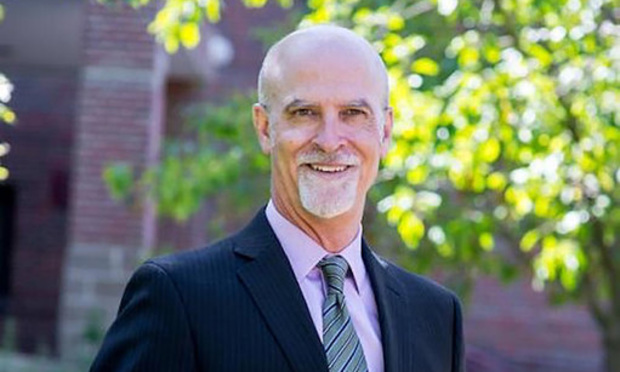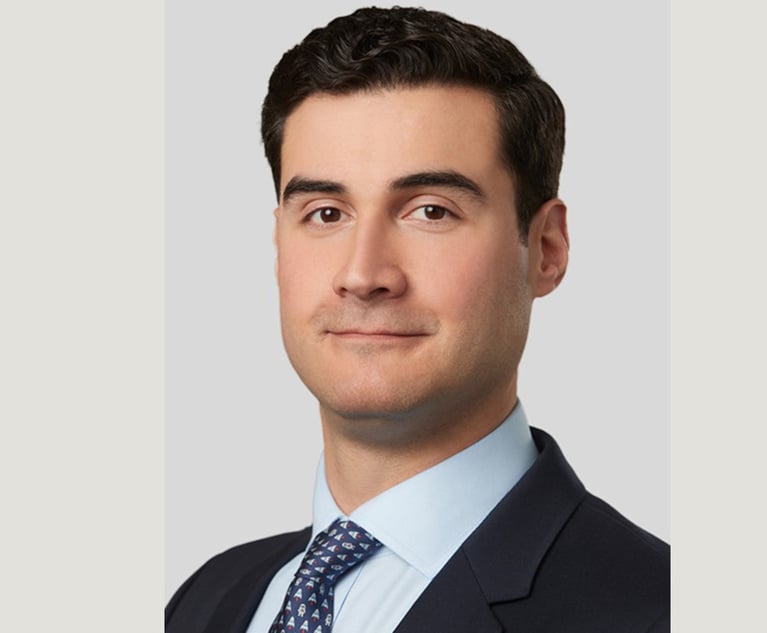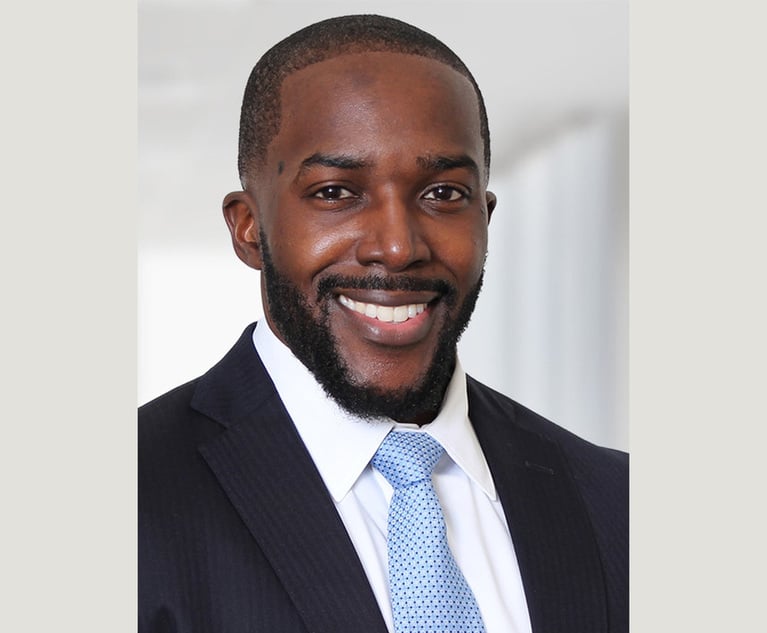Hemp Is Legal But Still Has Challenges: A Q&A With Patrick Goggin of California Hemp Council
Patrick Goggin, who is also a senior attorney at the San Francisco-based Hoban Law Group, has joined the council newly formed to continue the work of Vote Hemp after last year's Farm Bill took hemp off the Controlled Substances Act.
April 29, 2019 at 06:32 PM
4 minute read
The original version of this story was published on Corporate Counsel
 Patrick Goggin, general counsel of the California Hemp Council.
Patrick Goggin, general counsel of the California Hemp Council.
Shortly after becoming a licensed attorney, Patrick Goggin decided to devote his career to hemp legalization. Earlier this year, Goggin became the general counsel of the California Hemp Council, or CHC, in an effort to lobby the state to pass hemp-friendly legislation.
Goggin, who is also a senior attorney at the San Francisco-based Hoban Law Group, spoke to Corporate Counsel about the CHC and the current challenges surrounding hemp in California.
This conversation has been edited for length and clarity.
Corporate Counsel: What does the CHC do?
Patrick Goggin: The CHC was just formed earlier this year. It is a continuation of the work we've been doing over the years with the leadership of Vote Hemp. Vote Hemp is a national advocacy organization. I've been on the board of directors of Vote Hemp going back to 2005. It helped push legislation at the federal level and at the state level, but in particular California, since 2005. The challenge has been that we've been operating on a shoestring budget over the years and through the 2018 legislative session. We realized that we needed an ongoing lobbying presence in Sacramento to be protecting and pushing hemp's interest.
CC: Is a lot of the opposition to legalized hemp based on misinformation about the product?
PG: That is a definitely a big part of the issue. That all said, there was a big change this past December when the 2018 Farm Bill was passed and hemp was fully removed from The Controlled Substances Act. Prior to that, it had been authorized for production in states that had passed hemp statutes for research purposes. It was a half-step.
A lot of the need for our work is to educate both the politicians, regulators and also folks in the normal commercial space that just don't understand the distinctions between hemp and other strains. Frankly, there is a lot of confusion about the FDA's position on hemp and CBD from cannabis. What we're dealing with now is a transition from having to deal with the DEA asserting that it's a drug to dealing with the USDA and the FDA in regulating it appropriately and clarifying the different lanes for the product.
CC: Besides educating officials on hemp policy, what are your other responsibilities as the general counsel of the CHC?
PG: A lot of it is with various stakeholders on legislation that is going to be able to get through to a governor's signature. A lot of the job is to shepherd that bill through by continuing to adapt, revise and evolve it to ensure passage.
The other part is that we're dealing a lot of issues surrounding the California Department of Public Health. We've got two pieces of legislation moving this year. One of them is refining our agriculture code to conforming more closely to the 2018 Farm Bill. The other piece is with the Department of Public Health on the extract side, and that involves getting the CDPH jurisdiction over it. We've got a long road to go to get that agency to buy in for regulating hemp as a normal food. We want to treat hemp as a food and a dietary supplement and not in the same lane as marijuana.
The California Department of Food and Agriculture is just getting ready to issue applications for hemp registrations. A lot of counties have put moratoriums in place until that happens. At the Hoban Law Group, I represent a lot of farmers and businesses that are interested or in the midst of production. A lot of work is dealing with local municipalities both with the board of supervisors by dealing with the moratoriums or going in and education the departments of public health. I also interact with the county agriculture commissioners. They're the ones who are delegated authority by the CDFA to process applications.
When it comes to hemp, a lot of the issues need to be addressed at the local level. Education is a big part of it, as well as getting in and distinguishing hemp from the other side of cannabis.
This content has been archived. It is available through our partners, LexisNexis® and Bloomberg Law.
To view this content, please continue to their sites.
Not a Lexis Subscriber?
Subscribe Now
Not a Bloomberg Law Subscriber?
Subscribe Now
NOT FOR REPRINT
© 2025 ALM Global, LLC, All Rights Reserved. Request academic re-use from www.copyright.com. All other uses, submit a request to [email protected]. For more information visit Asset & Logo Licensing.
You Might Like
View All
How I Made Practice Group Chair: 'Collaboration Actually Makes the Job Fun,' Says Zachary Lerner of Troutman Pepper Locke

How I Made Partner: 'Be Open With Partners About Your Strengths,' Says Ha Jin Lee of Sullivan & Cromwell

How I Made Partner: 'Avoid Getting Stuck in a Moment,' Says Federico Cuadra Del Carmen of Baker McKenzie

How I Made Partner: 'Find Your Niche and Become the Go-To Person,' Says Shawn Hendricks of Stradley Ronon Stevens & Young
Trending Stories
Who Got The Work
J. Brugh Lower of Gibbons has entered an appearance for industrial equipment supplier Devco Corporation in a pending trademark infringement lawsuit. The suit, accusing the defendant of selling knock-off Graco products, was filed Dec. 18 in New Jersey District Court by Rivkin Radler on behalf of Graco Inc. and Graco Minnesota. The case, assigned to U.S. District Judge Zahid N. Quraishi, is 3:24-cv-11294, Graco Inc. et al v. Devco Corporation.
Who Got The Work
Rebecca Maller-Stein and Kent A. Yalowitz of Arnold & Porter Kaye Scholer have entered their appearances for Hanaco Venture Capital and its executives, Lior Prosor and David Frankel, in a pending securities lawsuit. The action, filed on Dec. 24 in New York Southern District Court by Zell, Aron & Co. on behalf of Goldeneye Advisors, accuses the defendants of negligently and fraudulently managing the plaintiff's $1 million investment. The case, assigned to U.S. District Judge Vernon S. Broderick, is 1:24-cv-09918, Goldeneye Advisors, LLC v. Hanaco Venture Capital, Ltd. et al.
Who Got The Work
Attorneys from A&O Shearman has stepped in as defense counsel for Toronto-Dominion Bank and other defendants in a pending securities class action. The suit, filed Dec. 11 in New York Southern District Court by Bleichmar Fonti & Auld, accuses the defendants of concealing the bank's 'pervasive' deficiencies in regards to its compliance with the Bank Secrecy Act and the quality of its anti-money laundering controls. The case, assigned to U.S. District Judge Arun Subramanian, is 1:24-cv-09445, Gonzalez v. The Toronto-Dominion Bank et al.
Who Got The Work
Crown Castle International, a Pennsylvania company providing shared communications infrastructure, has turned to Luke D. Wolf of Gordon Rees Scully Mansukhani to fend off a pending breach-of-contract lawsuit. The court action, filed Nov. 25 in Michigan Eastern District Court by Hooper Hathaway PC on behalf of The Town Residences LLC, accuses Crown Castle of failing to transfer approximately $30,000 in utility payments from T-Mobile in breach of a roof-top lease and assignment agreement. The case, assigned to U.S. District Judge Susan K. Declercq, is 2:24-cv-13131, The Town Residences LLC v. T-Mobile US, Inc. et al.
Who Got The Work
Wilfred P. Coronato and Daniel M. Schwartz of McCarter & English have stepped in as defense counsel to Electrolux Home Products Inc. in a pending product liability lawsuit. The court action, filed Nov. 26 in New York Eastern District Court by Poulos Lopiccolo PC and Nagel Rice LLP on behalf of David Stern, alleges that the defendant's refrigerators’ drawers and shelving repeatedly break and fall apart within months after purchase. The case, assigned to U.S. District Judge Joan M. Azrack, is 2:24-cv-08204, Stern v. Electrolux Home Products, Inc.
Featured Firms
Law Offices of Gary Martin Hays & Associates, P.C.
(470) 294-1674
Law Offices of Mark E. Salomone
(857) 444-6468
Smith & Hassler
(713) 739-1250








